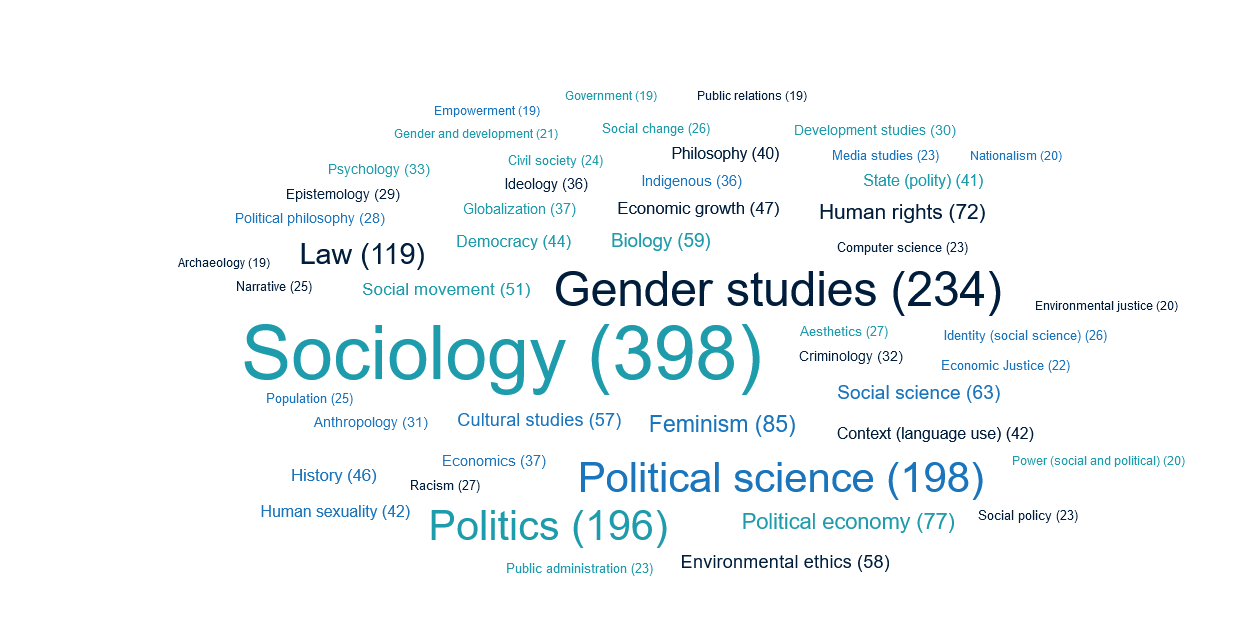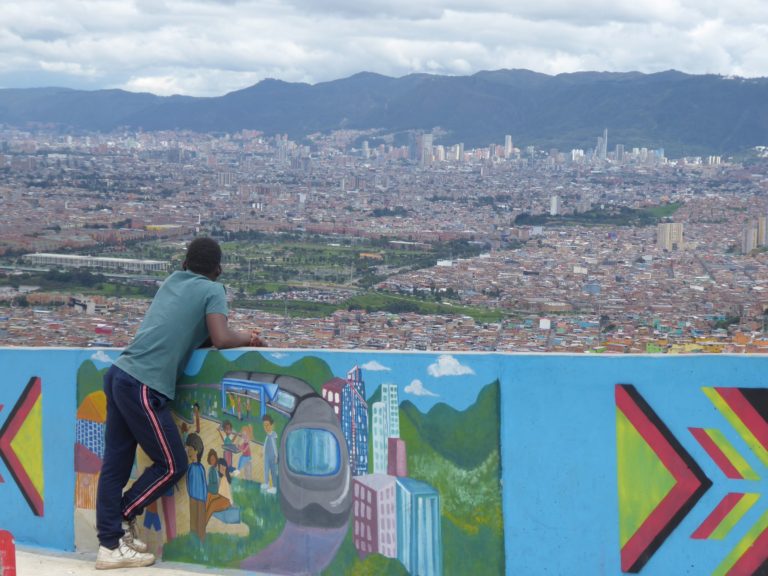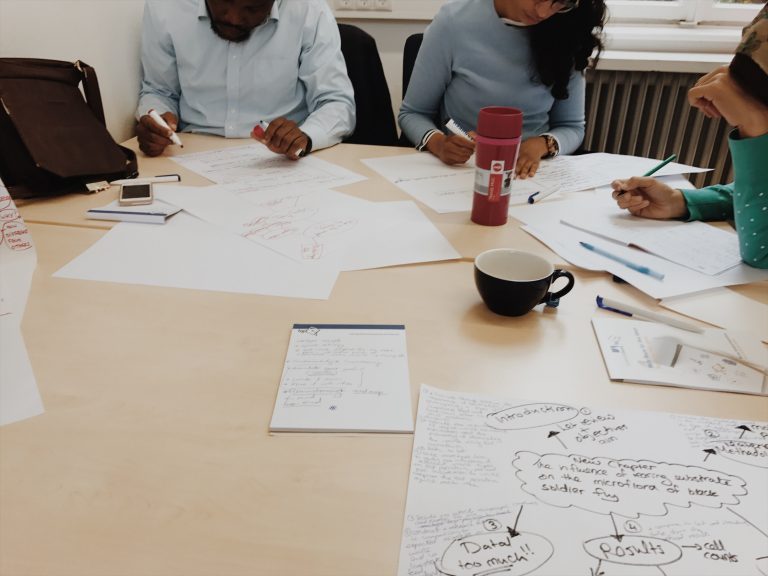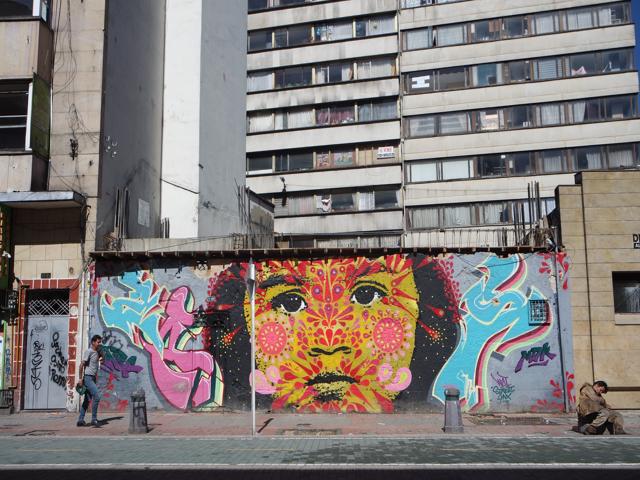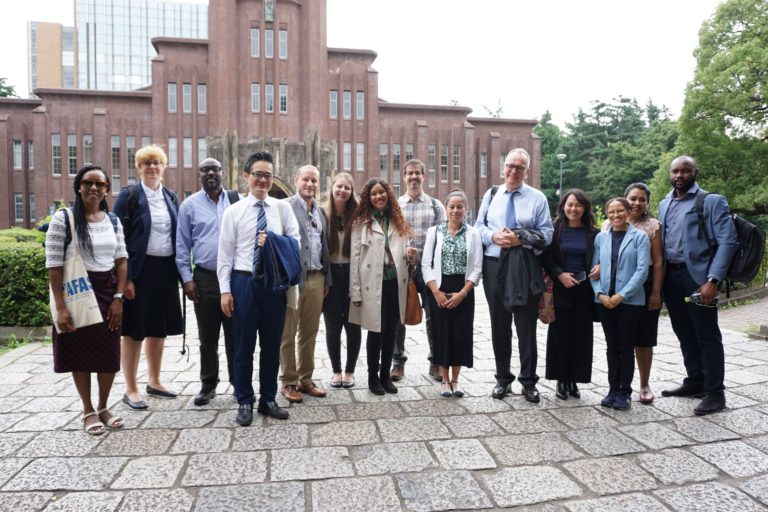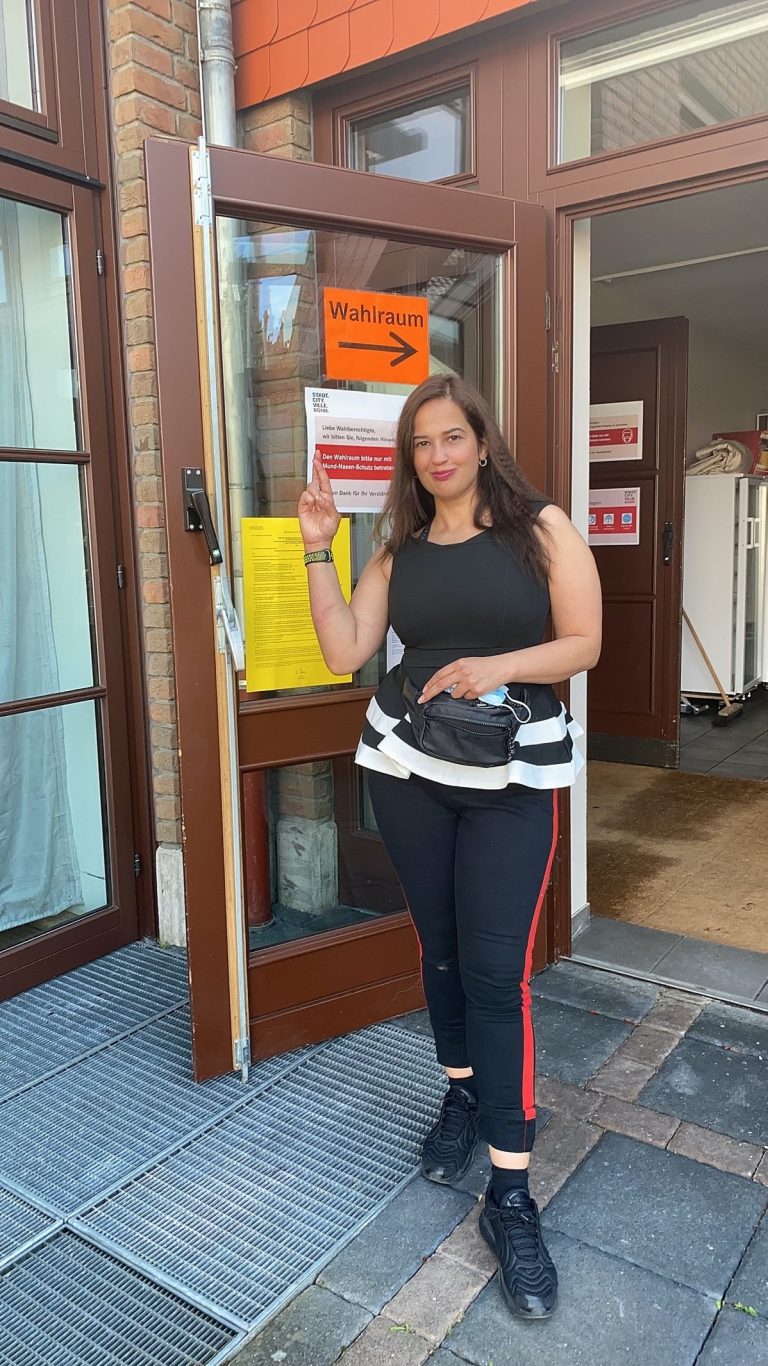A would-be match made in heaven: Activists and academics for women’s land rights. Part 1
The ZEF-Gender Group and the Feminist Land Platform
As scholars, we often become part of activist movements within the realms of high-level education. This can be through, for example, writing evidence-based articles show-casing social-economic or environmental injustices, signing protest letters, or, indeed, blogs. But what about talking and discussing with activists about how we could support each other?
This is one of the questions that made the ZEF Gender Group get in contact with the Feminist Land Platform (FLP), a group of ten women’s organizations from Africa, Asia and Latin America working on women’s land rights and gender justice. The contact resulted in a joint panel event on: “Women’s Land Rights and Transformative Practices” at ZEF on June 29, 2023 (read more in Blog 2 or watch the video here)*.
A common preoccupation is that women’s rights to land access and ownership are not only directly related to effective land-restoration, sustainable land-use and food security, but also to the capacity of women to exercise their human rights. The fact is that these interrelations, well-known since the 1970s, have not yet been fully translated into structural transformations. As the UNCCD (2022) reminds us: (E)ven in countries where women have the same legal rights as men to own and access land – as is the case in Costa Rica– only 15.6% of farm ownership is in the hands of women. In Central Asia and the Caucasus, despite legal gender equality under law, women own on average only 23% of land. In the Middle East and North Africa only 4% of women hold land titles‘[1].
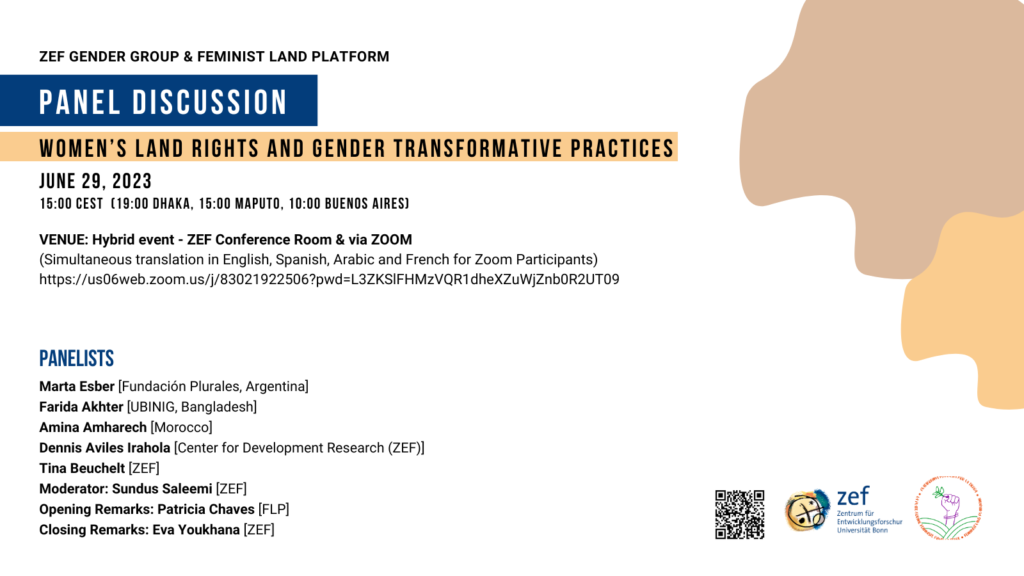
Scholars and civil-society activists on women’s land rights to work more closely together
Scholars are often seen as being disconnected from the realities of people living the same processes they study. This at least applies to the emotional and creative commitment that activists show in their work. The reality is that academics have been exposed to an accelerating rapid work pace and a rising work load in terms of conducting research, hunting for competitive funds, as well as handling teaching tasks and every day’s bureaucracy. This mix of requirements can certainly derail their youthful ideals about contributing to improving life on the planet in tangible forms.
However, it must not be like that. The borders between academia and activism are increasingly permeable. Think, for example, about the extent to which ‘academic activism’ and ‘grassroots- science’ touch margins by recognizing the value of other people’s (non-scientific) knowledge and their unique lived experiences. Or look at the extension and deepening of participatory research methods, transdisciplinary approaches and feminist transformative actions. All of them are being applied by academics as well as by civil-society organizations.
So, some activists have taken issue with this injustice, among them the FLP, whose actions aim at strengthening feminist movements in women’s land rights and gender justice. They do so by, for example, implementing capacity-building events and regional and national meetings between civil society and women farmers, fishermen and quilombolas.[2] FLP members take part in global and regional feminists’ political discussions and facilitate services to grass-root-organizations. The kind of services offered depend on the region and specific context. They may include giving legal advice on land rights as well as exploring local knowledge so women can get hold of native seeds and medicinal plants.
Do academics talk and listen to activists on women’s land rights?
Academicians are often criticized for being armchair activists. However, some academics combine their academic careers with activism and work with activists. We are often intrigued, inspired, and challenged by activists and activism. How do academia and academicians work with activism? A search of studies with the keywords ‘Gender’ or ‘women’s rights’, ‘land rights’, and ‘activism’ in the literature shows 708 studies from 1980-2023.
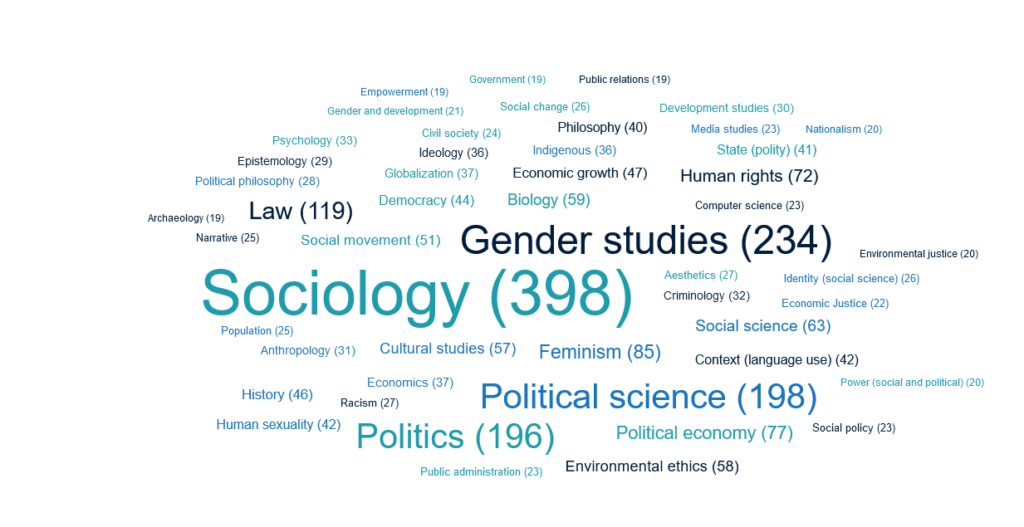
We visualized the disciplines of the published academic work related to gender, land rights, and activism using a word cloud. The word cloud above shows the fields in which these studies are mentioned. The size of the word depicts the frequency of the disciplines. The word cloud is based on journals written in English only. As we can see, about 398 studies published on this topic were in sociology, followed by gender studies (234 studies), political science (198 studies), and politics (196 studies). Though there is no base to compare, we could say that there are only a few studies covering this topic, though we can observe a growing interest. Studies have mainly been conducted in social-science disciplines and are nearly completely missing in economics and agriculture. We could also postulate that there is a closer relationship between academia and activism in the global south, and this would be reflected in more relevant literature in Spanish, Arabic or French. This is the case because many researchers in the global south emerge from the same marginal spaces they study and endure hardship first-hand. Our panelists from the Feminist Land Platform (FLP) were an example of this general presumption.
What is there to study about?
During the panel, we prompted the speakers to talk about knowledge gaps still to be addressed by academia that could support their work on gender justice and women’s land rights. They responded that there are a myriad of areas related to the right to access to land, its use and control, environmental and gender justice, and indigenous and peasant women’s access to basic rights, such as a life free of violence. It was quite interesting as most of the areas mentioned by the panelists are already being studied. So, we realized that they look at these issues from a different perspective: What does justice mean? Whose rights are being violated? And how do women experience and resist violence?
Voices and faces from our panel debate
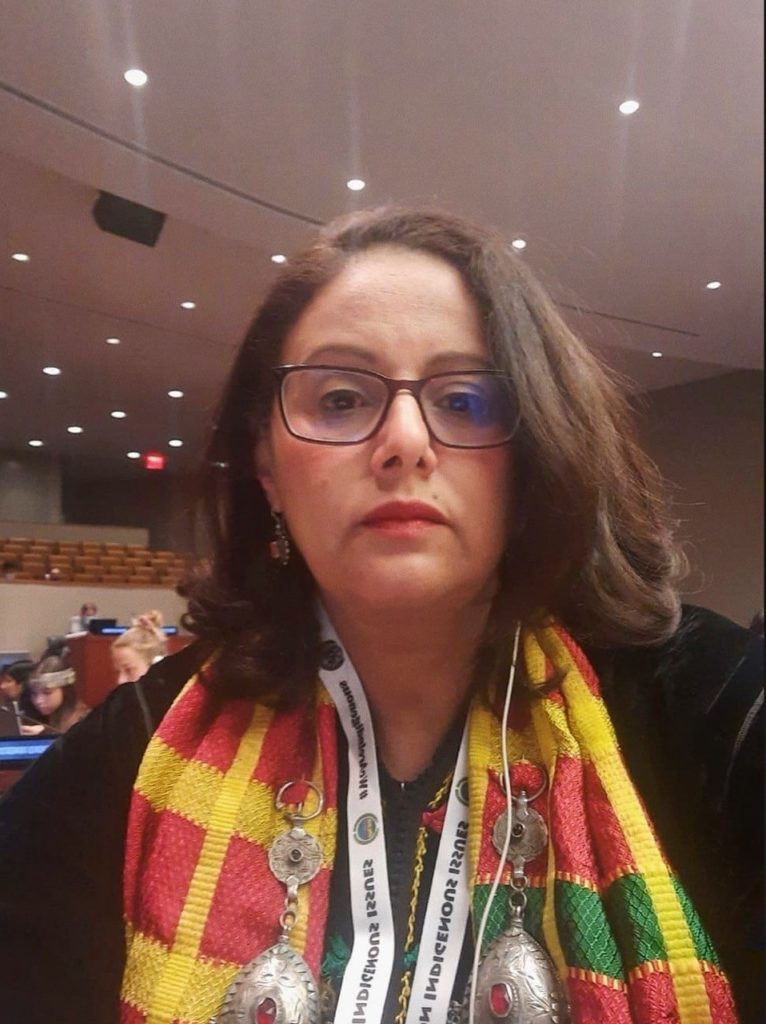
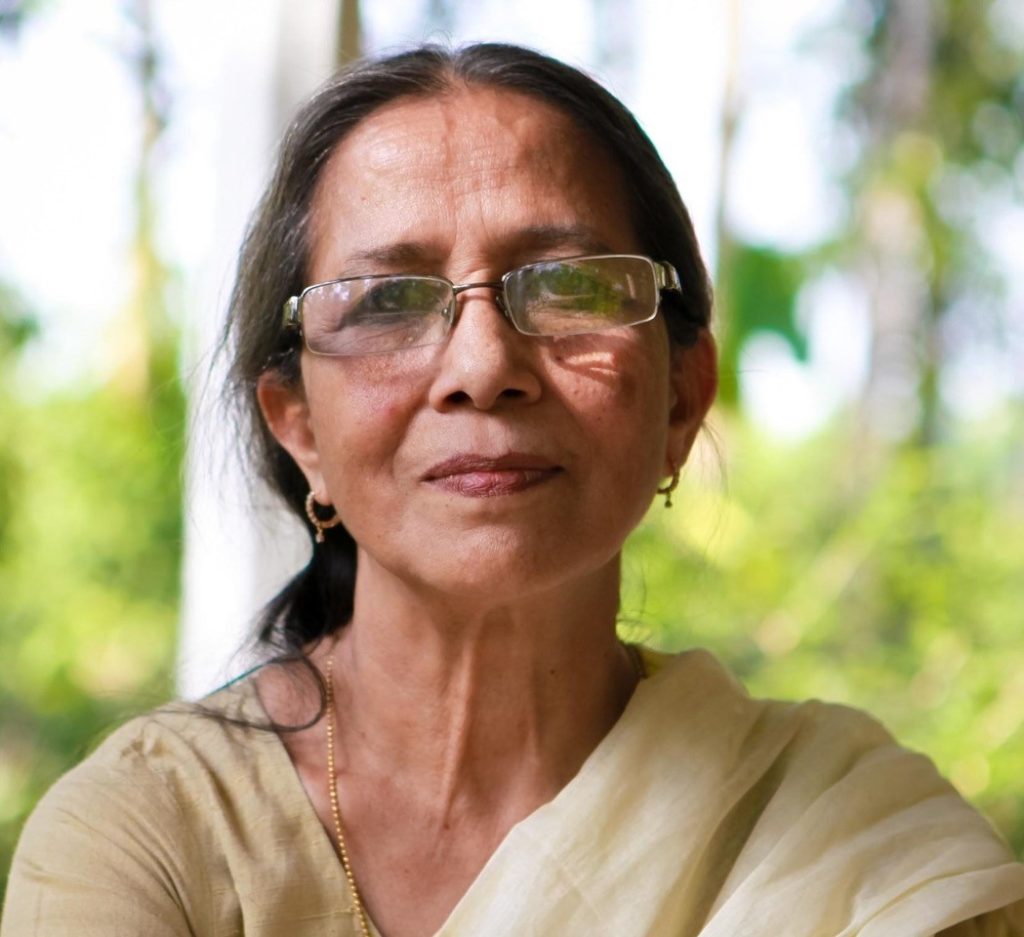
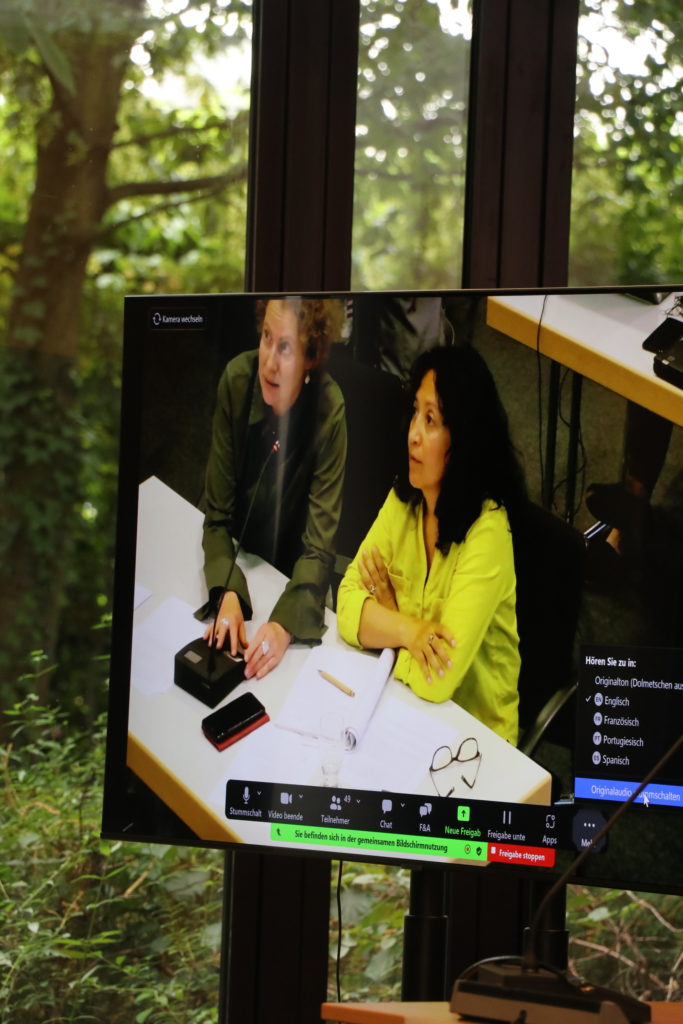
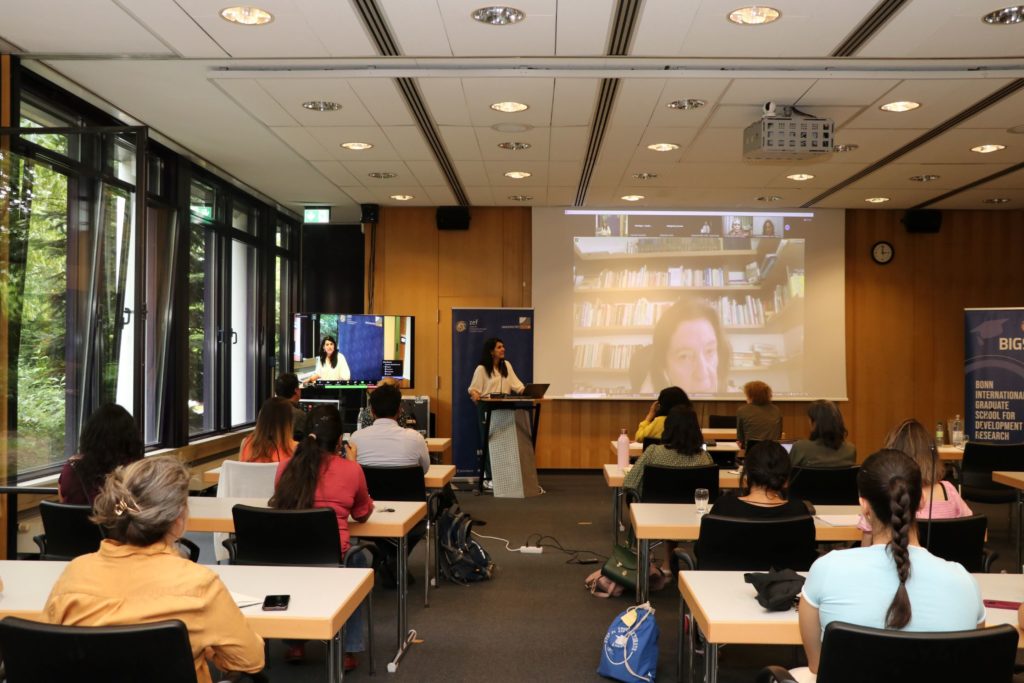
On the big screen: Patricia Chaves
“A very important difference in understanding between researchers and women activists or grassroots organizations is that we (activists) consider women as subjects, rather than an object of research”.
Patricia Chaves* from Espaço Feminista, Brazil
Clearly, activists talk not only about specific facts, but about the organized responses emerging from the mist of adversity too. Therewith, the subjects take center stage, and their rights as well as voices matter most to them.
“The security of women who fight for the rights to territory in the face of extractivism and patriarchy are most at stake (Paraphrased)”.
Marta Esber* from PLURALES, Argentina
Another critical take-away message on an issue identified by activists as being relevant for research is the implementation of women’s rights to land. This goes, as they explained, beyond formal laws and regulations.
“On the land issue, we usually talk about land rights, mostly legal and social aspects. Actually, there is much research on this topic. Meanwhile, there is a huge gap in the literature on access to land”.
Farida Akhtar from UBINIG, Bangladesh
The panelists also discussed that even when rights are secured, there are issues related to norms and institutions that are contextual and overlooked.
“In Morocco, the farmlands in collective ownership (“Les Terres Collectives”), are now registered under the names of female descendants of the original communal owners. This did not help women in any way because the land is still collectively owned”.
Amina Amharech*, from AZUL, Morocco
She expressed that academia is crucial in bringing these issues from a regional context into the international discourse. While collectively-owned land can act as a social security net in many contexts, the gender norms and current changes in land-use can have a contrary effect by placing women under male authority, unable to decide on the land they formally own.
Being humble being one of the messages
A strong message we received from the FLP’s panelists was the need for being humble. Academics need to be ‘re-educated’ on how to look at local realities.
“Female researchers need to be educated on how women are important knowledge-holders, they need to know their realities from their own perspectives. If we look at reality only from our own perspective, we fail to understand. To create this relationship between female researchers and women activists, we need to share knowledge, which is very enriching. Through a process that starts with sharing information, it is possible to fill a big gap in the world of research organizations”.
Patricia Chaves* from Espaço Feminista, Brazil
So the responses we received to our question: How academia, particularly female academics, can support in advancing women’s rights to land, were both humbling and inspiring:
- First, to work with women as subjects and not objects tells many of us that we are on a right path in our research, but still a lot needs to be done. This is easier said as done, as it requires more time, attention and probably more resources. This issue has already been raised in a journal article written by several ZEF researchers (see Avilés, et al. 2022: https://link.springer.com/article/10.1007/s10745-022-00344-2). However, much can be done if people’s views are prioritized, if we learn to see ‘as they see’, even if for a while.
- Second, female (and male) researchers learning from local women in an enriching exchange of knowledge requires, as Patricia Chaves said, ‘to be there’. We know that reality looks different ‘there’ than ‘here’, not only in geographical terms but also in the way privileges and subordinations operate. This makes people experience the world differently. So, ‘be there’ acquires a different meaning.
- Third, the world is diverse and patriarchy not only shapes local realities but also adapts to changing global processes, being them land markets, land-use change, or crop-specialization for export. Therefore, the panelists reminded us that context is relevant, and that global processes affect specific, concrete, brave women and their daily lives.
We thank the FLP members for their time and for sharing their immense lived knowledge.
Authors: Dennis Avilés-Irahola and Subash Surendran Padmaja
Dennis Avilés-Irahola is a senior researcher, and Subash Surendran Padmaja a junior researcher at ZEF
* The joint event by FLP and the ZEF Gender Group at ZEF on June 29, 2023 was held in hybrid mode and in four languages (Portuguese, French, English and Spanish). For practical reasons all quotes have been translated into English for this blog. The authors thank Gudrun Graichen-Drück of the International Women’s Center in Bonn (IFZ) for her translations of the responses originally made in French.
[1] Aguilar, Lorena. Study on the Differentiated Impacts of Desertification, Land Degradation and Drought on Women and Men. UNCCD, 2022. Available at: https://www.unccd.int/sites/default/files/2022-05/SDM_ENGLISH_webfile.pdf
[2] Afro-Brazilian settlements first established by escaped slaves in Brazil.
[1] The current members of the Feminist Land Platform are: Fundación Plurales (Argentina), Espaço Feminista (Brazil), Luna Creciente (Ecuador), PWESCR (India), AZUL (Morocco), Fórum Mulher (Mozambique), MUDECI (Mexico), Pastoral Women’s Council (Tanzania), Tin Hinane (Mali) and UBINIG (Bangladesh).

